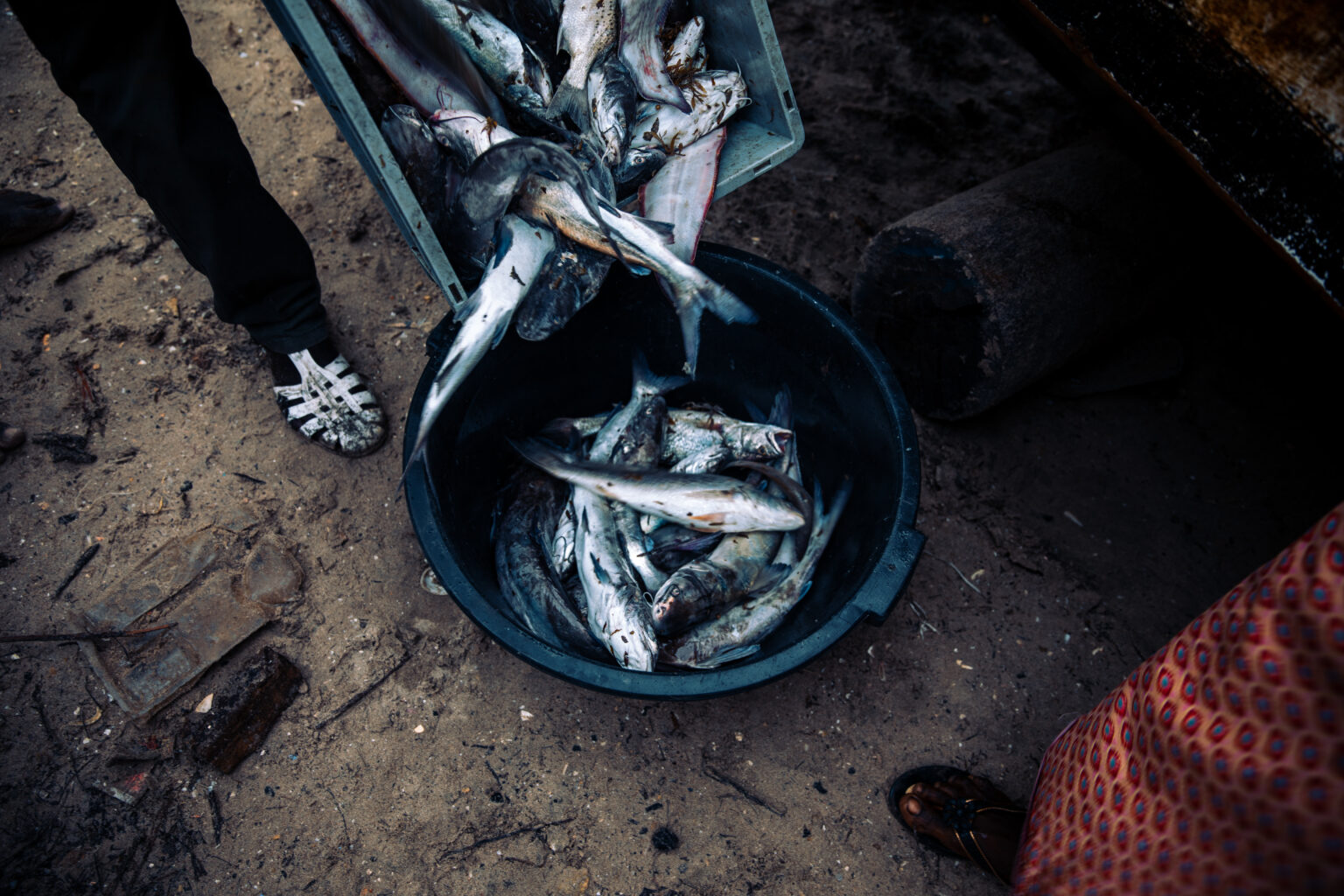The fishmeal trade is undermining human rights and putting jobs at risk in The Gambia, a new report has found.
Research by Amnesty International has uncovered a range of social and environmental problems caused by the West African country’s three fish processing factories, which are strung out along its 30-kilometre coastline.
The factories – which turn small, locally consumed nutritious fish such as bonga and sardinella into fishmeal flour and fish oil, for export – operate in communities that rely heavily on small fish for food and work.
A highly profitable marine ingredients trade funnels these fish to higher-value overseas markets, in particular as feed for aquaculture (or fish farming), pigs, chickens and supplements.
In the report – which surveyed village officials, tourism workers, fishmeal factory employees, and local fish workers, among others – researchers documented that the factories’ operations had caused small fish to jump in price, fish-smokers and dryers to lose work, and widespread pollution that had damaged the local ecology and tourism.
Communities also reported that the factories had not provided the jobs that were hoped for. The report said that local workers were employed in poorly paid, temporary positions, while foreigners took the majority of qualified posts.
In addition, the fishmeal trade was found to have been driving Illegal, Unreported and Unregulated fishing (IUU) in zones set aside for local fishers.
Gambian activist and journalist Mustapha Manneh described the industry to DeSmog as “inhuman and unethical”.
Since the arrival of the fishmeal factories in 2016, he said, the price of sardinella had tripled, while a study by the UN’s Food and Agriculture Organization (FAO) reported that the wholesale price of bonga has increased fourfold.
The Gambian factories – Golden Lead, JXYG, and Nessim – are partially or fully owned by Chinese investors. While the destination markets change from year to year in a notoriously opaque industry, trade data shows that in 2022, fishmeal produced in Gambia went mainly to China while fish oil, which is especially valued in salmon farming, was mostly exported to Chile.
“This report exposes in shocking detail the damage inflicted by the extraction of fish from West Africa, driven by demand from major aquaculture and agriculture corporations around the world,” said Yves Reichling from sustainable food campaign group Feedback EU. “We must put a stop to fishmeal and fish oil factories and ensure transparency in this industry if we want to see the health of the oceans and the people who depend on it secured for this – and coming – generations.”
In response to Amnesty’s allegation of IUU fishing, Nessim’s management said “we [do] everything legally and within the fishery guidelines”, adding that they “support and enhance the social and economic empowerment of the local people either directly or indirectly whenever we are operational”. No other factories responded to requests for comment.
The Gambian government was approached for comment.
A Growing Industry
Since 2016, industrial-scale fishmeal and fish oil (FMFO) production for export has concentrated on the North West Atlantic coastline, where a natural upwelling system brings vast shoals of pelagic fish.
Fishmeal and fish oil are made by cooking and pulverising these small wild-caught fish into nutrient-dense products that are then exported to feed Asian, European, and US livestock, pets, and “carnivorous” aquaculture, such as shrimps, salmon and sea bass.
Demand for marine ingredients outstrips supply, according to the FAO, putting the powerful marine ingredients sector under pressure to find additional sources of feed ingredients.
The fast-growing farmed salmon industry in particular depends on fish oil as a source of omega-3 fatty acids for salmon’s growth and welfare. This drives demand for fish oil from producer countries such as Norway, the UK (Scotland) and Chile.
Competition for Food
The pelagic fish used in fishmeal in Gambia – predominantly bonga, flat sardinella, and round sardinella – are the same fish local people eat and sell.
Inexpensive compared to other animal proteins such as meat and milk (and easily transported inland once preserved), pelagic fish are a staple food across Africa.
These small fish are also especially valued for their nutritional benefits, with high concentrations of micronutrients calcium, iron, and vitamin A.
Fishmeal factories are taking huge volumes of fish, competing directly with local people in Gambia where more than 80 percent of people rely on small fish – particularly bonga – as a source of protein. These species are also already under serious pressure, and have been categorised as overexploited by the UN FAO.
Official trade data for Gambia exists, though with the caveat that it is likely heavily under-reported. It shows that fishmeal production has jumped from just 67 tonnes in 2015 to 3,200 tonnes in 2020.
The new Amnesty report puts the figure even higher, at 3,700 tonnes in 2018. Using the industry estimate that it takes four to five kilograms of fresh fish to make one kilogram of fishmeal, this would mean Gambia’s fishmeal factories processed more than an estimated 16,600 tonnes of small pelagic fishes in 2018 – equivalent to a third of the country’s total fish catches that year.
Illegal, Unreported and Unregulated Fishing
According to an investigation by China Dialogue, the fishmeal industry is a major driver of IUU fishing in Gambia.
Artisanal fishers complain that their fishnets are cut daily by foreign industrial vessels that fish closer to shore than authorised. These vessels also fish illegally in zones reserved for artisanal fishers.
Fishmongers, who usually sell on to local markets, lose out to fishmeal factories when it comes to buying small fish. Fishermen will often choose to sell their fish directly to the factories, partly because they are guaranteed a sale, and sometimes because they are paying back loans.
The report also documents that women are losing work. Competition between the fishmeal industry and local sellers is eradicating jobs in a country where 80 percent of fish processors and 50 percent of small-scale fish traders are women.
A woman fish smoker interviewed by Amnesty International, Adami Jatta, has seen her work affected by industrial trawlers in Gambian waters – another threat identified in the report.
She complained that larger fish are becoming increasingly expensive, “from 2014 to 2016, three catfish would be 25 dalasi ($0.42) now four is 100 dalasi ($1.68).” Another fish smoker complained that he might spend a month without work because of the lack of fish.
Environmental Impacts
Fishmeal factories in Gambia were also found to be operating in ways that are environmentally damaging. In May 2017, a lagoon near Golden Lead’s plant turned a deep red and filled with dead fish. This was found to be due to the very high concentration of phosphates in the wastewater from the fishmeal plant, causing algae blooms and anoxic conditions.
In addition to polluting the environment by dumping wastewater, the pungent smell emanating from fishmeal factories has been described as unbearable. Local tourism – an important source of employment in The Gambia that contributes 20 percent of the country’s GDP – is threatened.
One restaurant and lodge owner in Sanyang, near the Nessim factory, told Amnesty that the factory’s smell had hurt their business, with one customer checking out at 3am because they could no longer stand the stench.
Future Prospects
The problems that fishmeal factories cause are seen throughout West Africa. Production has increased exponentially in over the past ten years in Mauritania, Gambia and Senegal.
In all three countries, fisheries regulations are historically under enforced. None of the fisheries targeted by the fishmeal and fish oil industries in sub-Saharan Africa are yet certified by Marin Trust or the Marine Stewardship Council as being ‘sustainable’ or ‘responsibly managed’.
While fishmeal and fish oil from West Africa only makes up a small percentage of the overall market – in 2020, Mauritania, Senegal and The Gambia accounted for just under four percent of the world’s share of exports – the past decade has seen a leap in the volume sourced from this part of the world.
To date, the controversy around fishmeal factories has helped limit their spread. Campaigns by activists like Mustapha Manneh and women fish workers in neighbouring Senegal, which is home to another five processing plants, have succeeded in extracting commitments from their respective governments not to grant licenses for new factories. But there has been little progress in halting the production of existing operations in a profitable market.
With the majority of the fish oil produced in West Africa in recent years bound for Europe as well as Norway, Chile and Turkey, Feedback EU believes part of the solution lies in tackling demand.
Feedback’s Yves Reichling suggests “minimising” the consumption of farmed fish that relies on fishmeal and fish oil, such as farmed salmon.
“For consumers in the Global North, we advise diversification of the kinds of fish we eat,” he said. He suggested farmed seafood like mussels or seaweed that does not require feed, or else small whole fish from certified fisheries.
Amnesty’s report authors called for the international community to “regulate the fish-based feed industry to limit the use of fishmeal and fish oil (FMFO) made from fish that are already overexploited and increase transparency”.
In the meantime, Mustapha Manneh was not optimistic about the future prospects for the livelihoods of fish workers in The Gambia. “There is no future,” he said. “Nobody deserves this”.
Edited by Hazel Healy
Subscribe to our newsletter
Stay up to date with DeSmog news and alerts






